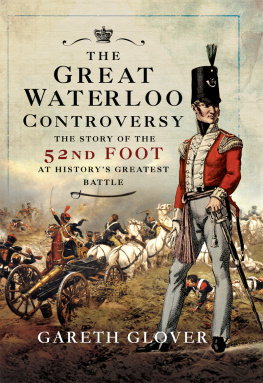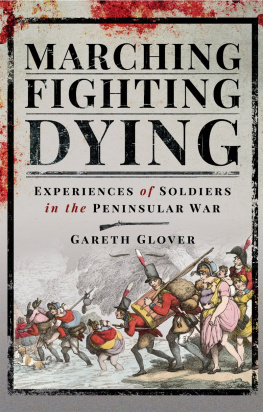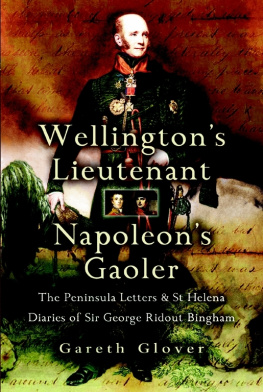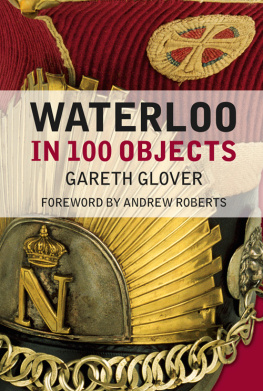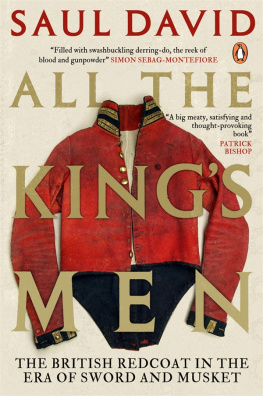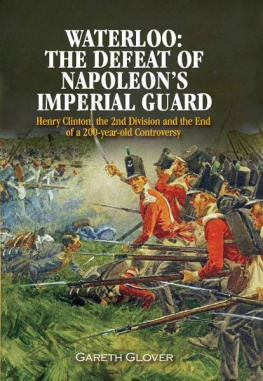

The Waterloo Archive: Volume IV
This edition published in 2012 by Frontline Books,
an imprint of
Pen & Sword Books Limited, 47 Church Street,
Barnsley, S. Yorkshire, S70 2AS
www.frontline-books.com
email info@frontline-books.com
Gareth Glover, 2012
Foreword Joanna Hill, 2012
The right of Gareth Glover to be identified as Author of this Work
has been asserted by him in accordance with the
Copyright, Designs and Patents Act 1988.
9781783033249
All rights reserved. No part of this publication may be reproduced, stored in or introduced into a retrieval system, or transmitted, in any form, or by any means (electronic, mechanical, photocopying, recording or otherwise) without the prior written permission of the publisher. Any person who does any unauthorized act in relation to this publication may be liable to criminal prosecution and civil claims for damages.
A CIP data record for this title is available from the British Library.
For more information on our books, please visit
www.frontline-books.com , email info@frontline-books.com
or write to us at the above address.
Typeset by Palindrome in Stempel Garamond 10/12 pt
Printed by CPI Group (UK) Ltd, Croydon, CR0 4YY
FOREWORD
The Duke of Wellington pointed out in his Foreword to the first volume of Gareth Glovers impressive Waterloo Archive series that we are fast approaching the bicentenary of the great battle. After two hundred years, you might have thought that general reader interest would have begun to wane a little; not so! In 2011 alone at least a dozen new titles were published. I do not know how many accounts of Waterloo will be appearing before 18 June 2015, but the genuinely exciting thing about this period of history is that there is such a wealth of material that still lies hidden, waiting to be unearthed, in dusty archives, private houses and even uncatalogued in various libraries. Of course, there is a great deal that is now in the public domain in county record offices, although even this is sometimes difficult to find as it may be bundled with other material of the period, in the National Archives, the British Library and the National Library of Scotland among others.
Today, one of the most interesting sources of new material, as Gareth has proved once more, are the letters written home by enlisted men. These are relatively rare, when compared to those written by their officers, partly because the majority of such men could not read or write. However, there was among them, fortunately, a number who had taken the kings shilling, and who had received some education; their opinions of the battles, of their officers, the food, the ghastly injuries, the enemy and their fellow soldiers are fascinating. The most vivid are, of course, those written immediately following the action, before the writers pride and imagination had added facts and aggrandised his own role in events; after all, the Prince Regent himself became convinced that he had won the great battle at Waterloo virtually single-handed! Gareth Glover, in this fourth volume of the Waterloo Archive, has once again managed to search out an interesting selection of previously unpublished letters. These letters were, principally, written to family members back in Britain, as events unfolded in the Netherlands and, subsequent to the battle itself, in and around Paris. The personal details of everyday campaigning, some fairly trivial in themselves, when added to graphic accounts of the blood and guts of warfare in 1815, bring both the men and the entire Waterloo Campaign very vividly to life.
Gareth Glover opens his fourth volume with an introduction which, among other events, refers to (later Sir) Digby Mackworths account of 18 June and the events surrounding it. This was written as night fell on an exhausted, battered Allied army. Mackworth, as far as it is possible to tell two hundred years later, wrote his description of the battle in a hut he shared with nine others, including his general, Rowland Hill. There seems no reason to suppose that he fabricated any part of what he wrote but, of course, in his description of the battle itself, it was his own view of events, those that he had seen for himself as a member of the 2nd Corps, which he recorded. The 2nd Corps was commanded by Lieutenant General Lord Hill to whom, Mackworth was an ADC. Mackworths description of events in and around Brussels both before and after 18 June add richly to accounts already in the public domain.
Lord Hill has received little notice for the part that he played in the events of the great day; Mackworth and Orlando Bridgeman, another of Hills ADCs and the generals fellow Salopian, have gone some way to redress this oversight. Hill was a very modest man, popular and beloved of the private soldiers thanks to the care and compassion that he demonstrated towards them. It is obvious that Bridgeman and Mackworth both felt great affection and admiration for their general.
Joanna Hill
ACKNOWLEDGEMENTS
As with the previous volumes of this series, a large number of people, particularly in the various archives of this country, deserve special thanks for helping me unearth such valuable material, providing copies for me to work on at my leisure and eventually kindly granting me permission to publish. Each particular memoir or series of letters indicates its source and particular reference; but a few people have been exceptionally gracious of their time and support. Those who deserve special mention are Iain Brown of the National Library of Scotland, which holds a number of gems; Dr Alistair Massie of the National Army Museum; Brian Owen of the Royal Welch Fusiliers Museum; Eunice Shanahan and Andrew Prince, both of Australia, for permission to use material in their possession and Alan Lagden, who has provided material from his own collection. I must also thank the Journal of The Society for Army Historical Research (JSAHR) and the Wellcome Trust for allowing me to utilise their material.
But what heartens me more than anything else is the incredible support of fellow enthusiasts and I must particularly mention Mick Crumplin for his medical expertise, Ron McGuigan for his encyclopaedic knowledge of service records and seemingly endless ability to discover references for anything, always answering even the most obscure questions I challenge him with; and Pedro Ramiro whose language skills are tested frequently. Such tireless devotion to the general drive to improve our understanding of Napoleonic history never fails to amaze me and reaffirms my faith in a community that to outsiders can sometimes appear at war with itself and full of cranks. As usual I must thank Philip Haythornthwaite for checking my text and suggesting numerous corrections/improvements from his encyclopaedic knowledge.
I must also thank my wife, Mary, who never ceases to encourage and support me in all I do and my two now adult children, Sarah and Michael, who inspire me to strive to introduce a new generation to this fascinating subject.
Gareth Glover
INTRODUCTION
I have explained in previous volumes that a great deal has been written on the subject of the Battle of Waterloo and the campaign that surrounds it and that there is even a smattering of works that deal with the subsequent three-year occupation of France by the Allied powers. However, during my studies of this fascinating campaign, I have become painfully aware that much modern material has become a stereotypical regurgitation of previous publications with little if any new research. This to my mind is a terrible crime, as the archives of Europe, and of Britain particularly, are teeming with fascinating documents that are gathering dust, and the ink is fading with time and the paper crumbling, and the material is virtually ignored by many self-acclaimed historians and experts of this campaign.




